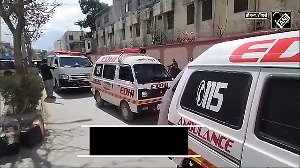A report documenting the constant 'stream of bias and prejudices' against Sikhs, based on surveys of more than 1,000 members of the community in the five boroughs of New York City, was released in the city by the Sikh Coalition earlier this month.
The key findings include that 41 percent of Sikhs in New York have been called derogatory names; one in 10 have reported that they have been refused employment or promotion because of their identity, and 50 percent have been harassed in school because of their religion or national origin.
The report, titled Making Our Voices Heard: A Civil Rights Agenda for New York City's Sikhs, identifies what it calls 'significant gaps' between the promise of the law and the Sikh community's realities on the ground.
 |
It was released ceremonially on the steps of the City Hall during a civil rights rally April 14 attended by about 100 members of the community, and proposes a Sikh Civil Rights Agenda.
The agenda seeks to address a comprehensive list of concerns, ranging from language spoken at area hospitals to violent crimes and employment discrimination. The group said that on all these issues, the reality has been at odds with the requirements of the law.
"This report gives us the tools we need to fight the issues it identifies head on," Neha Singh, a lawyer who is the coalition's advocacy director, said. "By putting the Sikh situation in numbers, we will be able to show lawmakers exactly how egregious some of these problems are, and draw their attention to getting the problems addressed.
"The Civil Rights Agenda will provide us with a to-do list, and will hopefully give the authorities some idea of what sorts of efforts will be most effective in remedying Sikh issues," she told rediff.com.
She admitted that a report alone will not end discrimination; implementation was critical, she said, and to achieve that, the Coalition needed to work in concert in the coming months.
"Training law enforcement is one of many recommendations that we make in our Civil Rights Agenda, but training alone will not be enough," Singh said.
"The Sikh community needs to build bridges with local law enforcement; we need to work on educating the broader community to accept us as part of America, and we need to be vigilant and vocal in protecting our rights when anyone oversteps the line. We need to change perceptions across the board -- not just with law enforcement officials."
Amardeep Singh, executive director of the coalition, hoped the report would serve as a wake-up call to all those who take civil rights for granted. He said the findings are a sobering reminder that although one has come a long way in protecting civil rights in the US, there is a still a long way ahead.
The report makes many recommendations, including passing a Hate Crime Backlash Prevention Act; training city prosecutors on the ways and circumstances under which Sikhs have been particularly subjected to hate crimes; implementing the Dignity in all Schools Act to protect students by prohibiting and tracking all bias-based harassment in public schools; and ending employment discriminations.
Four City Council members -- John Liu, David Weprin, Leroy Comrie, and Robert Jackson -- attended the release of the report, as did state Assemblyman Jose Rivera from the Bronx and Chancellor Joel Klein of the New York Department of Education.
'This report takes the critical step of putting forth a bold prescription on ways government may best address these issues. I thank the members of the Sikh Coalition for their education and advocacy efforts in creating this community-based comprehensive report,' Liu said.






 © 2025
© 2025